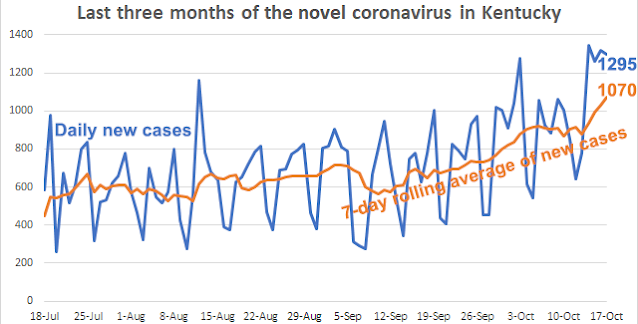New-case totals highest for a Saturday, third highest overall; top 3 have all occurred this week; Beshear alludes to Republican jabs

Kentucky Health News graph, from unadjusted daily counts, excluding large backlogs
—–
By Al Cross
Kentucky Health News
Kentucky reported 1,295 new cases of the novel coronavirus Saturday, and “All of our other numbers are going the wrong way, too,” Gov. Andy Beshear said in a press release that announced 12 covid-19 deaths. “More Kentuckians hospitalized and in the ICU than ever,” 691 and 185, respectively.
Actually, those hospital numbers were not records, and there was a positive number in the state’s daily report; the share of Kentuckians testing positive for the virus in the last seven days was 4.62 percent, down from 4.7% the day before.
Still, the number of new cases was the highest of any Saturday, and the third highest of any day, with the top three days coming this week. Friday saw 1,319 and Wednesday saw 1,346. (On Oct. 7, the state recorded 2,398 cases, but most were from a weeks-long backlog in Fayette County.)
“Things are not moving in the right direction; they continue to escalate,” Beshear said. “This virus is our enemy, not each other.”
Beshear, a Democrat, appeared to be responding to jabs from Republicans in recent days. Treasurer Allison Ball accused him of using state funds to violate religious freedom at churches this spring, and State Rep. Savannah Maddox and U.S. Rep. Thomas Massie said Beshear was facing a “smackdown” of his emergency powers when the legislature convenes in January.
Beshear spokeswoman Crystal Staley responded to Ball Friday: “The governor took the same steps as the majority of states with regard to mass gatherings, including in-person religious services . . . after many cases and deaths were linked to mass gatherings.” She added, “None of these issues are new and the timing of the report seems political.”
Ball declined further comment, saying she would present a report to the Interim Joint Committee on the Judiciary next Thursday. Her fellow Republicans control the committee and the legislature.
Saturday’s 12 deaths raised the state’s covid-19 death toll to 1,312.
Beshear said the new cases “are all over the place.” Counties with more than 10 were: Jefferson, 295; Fayette, 115; Warren, 55; Madison, 26; Christian 25; Daviess, 23; Barren and Kenton, 21; Bullitt, Hardin, Jessamine and Shelby, 20; Boone, Nelson and Whitley, 19; Hopkins Oldham and Perry, 18; Boyd and Johnson, 17; Campbell, Henderson and Laurel, 15; Logan and Marion, 13; McCracken and Russell, 12; and Muhlenberg, 11.
Kentuckians 18 and younger accounted for 162 of the new cases; 27 of them were 5 and under. The youngest was 7 days old.
“October is on pace to be our highest ever number of coronavirus cases reported within a month,” Health Commissioner Steven Stack said in the news release. “We’re in the midst of an escalation in cases and our hospitalizations are increasing now, too. As the holidays approach, it’s imperative to limit further spread. Practice social distancing, wear a face covering and practice good hand hygiene to reduce your chances of contracting covid-19.”
Beshear said, “We know what it takes to stop these numbers from escalating. People’s lives depend on it.”
In other coronavirus news Saturday:
- The virus is killing more men than women because men have weaker immune systems that, in some cases, may actually sabotage the body’s response to an invader,” The Washington Post reports, citing research. “But social and cultural factors may also play a role. . . . Broadly speaking, men may be less likely to be worried about covid-19 than women, fitting the pattern that women generally treat health risks more seriously.”